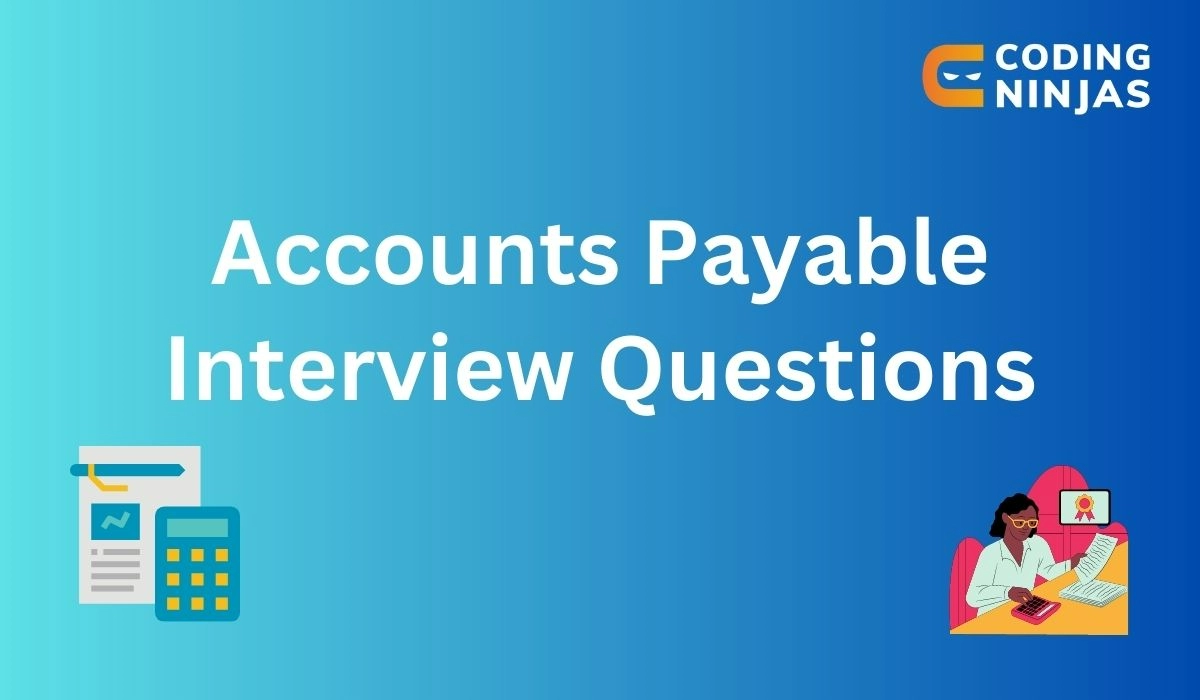10 General Accounts payable Interview Questions and Answers
1. What are the main functions of accounts payable?
Ans. The main functions of accounts payable include invoice processing, vendor payments, maintaining vendor relationships, matching invoices, updating records of payments, etc.
2. What is the three-way matching for accounts payable?
Ans. The three-way matching for accounts payable is purchase orders, invoices, and receipts.
3. What are the three basic accounts?
Ans. The three basic accounts are personal, real, and nominal accounts.
4. Is accounts payable a debit or credit?
Ans. Since accounts payable comes under the liability column, it has a credit entry.
5. What is a liability?
Ans. A liability is something that the company owes to other parties. It is a business’s obligation to pay other people or businesses.
6. What is an invoice?
Ans. An invoice is a document consisting of the goods or services delivered by the vendor, the total amount to be paid for them, and the due date. It is given by the supplier to the buyer.
7. What steps should be taken before approving an invoice for any payment?
Ans. The steps are as follows:
-
Verify the invoice documentation. Use your records to check if the details on the invoice match your records.
-
Check the invoice date and number to see if the invoice still needs to be paid.
-
Record the invoice in the system if all the details are accurate for accounting purposes.
-
Send the invoice for approval after all the details are checked, and make an entry in the record.
- Finally, make the due payments to the supplier and update the record in the system.
8. How to ensure taking advantage of early payment discounts?
Ans. Reviewing all the invoices is necessary to determine if any discounts can be availed by paying earlier than the due date. If there are, payments must be made before the due date to take advantage. Also, all the benefits due to early payments must be recorded to track the cost savings.
9. How to maintain good relationships with suppliers?
Ans. Smooth payment processing is the key to a good relationship with any supplier. Payments should be made timely for maintaining positive relationships with the vendors. Also, in case of any issues, an account payable professional should be responsive and punctual to confront and resolve them with the vendors. The invoices should be paid as agreed as well.
10. Why is an invoice number important?
Ans. An invoice number is a unique code the company assigns to an invoice. It helps in identifying the invoice in records and for tax payment purposes. It is important because it tracks the status of payment.
Technical Accounts Payable Interview Questions
11. Name the types of assets.
Ans. There are various types of assets based on their classification. If classified based on convertibility, there are two types of assets: current and fixed.
12. What are debit and credit from the point of view of a customer?
Ans. From a customer’s point of view, debit is something receivable, and credit is something payable.
13. What is GAAP?
Ans. GAAP stands for Generally Accepted Accounting Principles. These are the norms given by Financial Accounting Standards Board. Principles under this are accepted, and they increase the clarity of accounting records. It also helps in increasing the consistency of records.
Also see, Power Electronics Interview Questions
14. What are PO and Non-PO invoices?
Ans. PO stands for Purchase Orders. It consists of certain specifications of the order. A PO invoice is generated when a pre-approved order is sent to the vendor. When a purchase is made without a PO, a Non-PO invoice is generated. A Non-PO invoice is also called an expense invoice used for indirect purchases.
15. What tools are used to handle the accounts payable process?
Ans. Tools used to handle the accounts payable process are:
-
QuickBooks or Xero helps are some accounting software. They help in tasks such as handling invoices, tracking payments, etc.
-
Data analytics tools help in analyzing the data. These help in identifying trends and scopes for improvement. These are Tableau or Excel.
-
Machine Learning algorithms offer a great deal in handling large amounts of data. These algorithms identify patterns and help in forecasting future results. These are very useful.
- RPA(Robotics Process Automation) software help in those tasks which are highly repetitive in nature like the entry of data. Using this software improves efficiency.
16. What is the critical difference between accounts payable and accounts receivable?
Ans. Accounts Payable refers to the credit due to the suppliers for goods or services yet to be paid. It is a liability for the company. Accounts receivable refers to the debit others owe to the business. Accounts receivable is a form of an asset.
17. Who is a consignor and who is a consignee?
Ans. A consignor is someone who provides goods and services. A consignee is someone who receives the goods and services. Until full payment is received, the consignor owns the goods supplied. There is an agreement between the consignor and the consignee that the consignee has to pay for the goods and services before the due date.
18. What is GRN?
Ans. GRN stands for Good Received Notes. It is a record of all the goods the buyer has received. It acknowledges the delivery of goods by the vendor and the receipt by the customer.
19. How to create purchase orders and track invoices?
Ans. The following steps are taken to create purchase orders and track supplier invoices.
-
List the goods and services required.
-
Determine a vendor who can provide the required goods and services at a reasonable price.
-
Create a purchase order including all the conditions of the purchase.
-
Send the purchase order to the supplier for acceptance.
- Manage the vendor invoices for verification of details and for timely payment.
20. What do you mean by SOX in accounting?
Ans. SOX stands for Sarbanes Oxley Act. It is a United States federal law covering financial reporting laws and regulations.
Behavioral Accounts Payable Interview Questions and Answers
21. What are the steps to be taken before making a payment?
Ans. The following steps are to be taken before making a payment:
-
Check for any advance payments made for the total amount.
-
Check if all the services are delivered.
- Check for any issues with the goods or services delivered before making the final payment.
22. How to control costs in the accounts payable process?
Ans. There are different ways to control costs in the accounts payable process. Taking advantage of early payment discounts is one of them. Others can be negotiating credit terms with the suppliers and finding cost-effective vendors. Also, checking the invoices from the vendors to ensure that payments are made only for the goods and services purchased is necessary.
23. How to handle cancellations or returns?
Ans. The following measures are to be adopted when cancellations or returns of goods or services are made.
-
Review the vendor agreements to review the terms of cancellations or returns, including any fees.
-
Confirm the cancellations or returns to the supplier with proper reasons.
- Update the record in the system ensures the credits are correctly reflected.
24. What is a trade discount? What is its benefit?
Ans. A trade discount is a reduction in the listed price of a product or service offered by a manufacturer or wholesaler to encourage large-volume purchases by retailers. This discount serves as an incentive for businesses to buy in bulk, fostering stronger relationships between suppliers and retailers. The primary benefit lies in stimulating higher sales volumes, aiding inventory turnover, and improving cash flow for both parties. It allows retailers to enhance profit margins or offer competitive pricing to end consumers. Ultimately, trade discounts facilitate a more efficient and mutually beneficial supply chain, promoting business sustainability and growth.
25. What do you understand by Fringe Benefits Tax or FBT?
Ans. Fringe Benefits Tax (FBT) is a tax levied by some governments on the non-salary benefits provided by employers to their employees as part of their remuneration package. These benefits, outside of regular wages, may include perks like company cars, housing, or health insurance. The FBT ensures that employees are taxed on the full value of their compensation, discouraging the substitution of taxable income with non-cash benefits. Employers are typically responsible for paying the FBT, aiming to maintain fairness in the taxation system and prevent the circumvention of income tax through the provision of fringe benefits.
Frequently Asked Questions
How do I prepare for an accounts payable interview?
Prepare by familiarizing yourself with accounts payable processes, financial terminology, and relevant software. Practice answering common interview questions and be ready to discuss your experience in accounts payable and problem-solving skills.
When should you use those accounts payable interview questions?
These interview questions are suitable for both interviewers assessing candidates for accounts payable positions and candidates preparing for accounts payable interviews. Use them to gauge candidates' knowledge, experience, and suitability for roles in accounts payable.
How to hire an accounts payable specialist?
To hire an accounts payable specialist, create a job description outlining required skills, experience, and qualifications. Screen candidates based on their accounts payable knowledge, experience with relevant software, attention to detail, and ability to manage deadlines.
What are the 4 functions of accounts payable?
The four main functions of accounts payable are invoice processing, vendor management, payment processing, and reconciliation. These functions involve receiving and recording invoices, managing vendor relationships, processing payments accurately and timely, and reconciling accounts to ensure accuracy and compliance.
Conclusion
In this blog, we have discussed Accounts Payable Interview Questions. Mastering the intricacies of accounts payable is essential for both interviewers and candidates in the financial sector. This blog has provided a comprehensive overview of common accounts payable interview questions, covering topics ranging from preparation tips to hiring best practices.
To learn more about DSA, competitive coding, and many more knowledgeable topics, please look into the guided paths on Coding Ninjas Studio. Also, you can enroll in our courses and check out the mock test and problems available. Please check out our interview experiences and interview bundle for placement preparations.
Selenium Interview Questions
Javascript interview questions
jQuery interview questions






